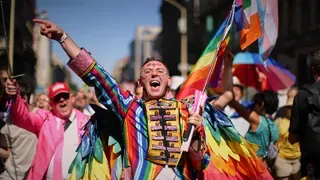February 7, 2022
How Inspire Recovery Dismantles Transphobic Addiction Treatment From Within
Lauren Emily Whalen READ TIME: 4 MIN. SPONSORED
The moment someone chooses to seek help for addiction can often be filled with anxiety. The opportunity for a sober life – and what it will take to maintain it – may overwhelm someone relying on drugs or alcohol. That moment of entry is crucial and one that Inspire Recovery recognizes is particularly important for the LGBTQ+ community.
The West Palm Beach drug and alcohol treatment center embodies its mantra, "a creative, safe space for the LGBTQ+ community in recovery," in every aspect of its operation, including a website that puts queer faces and language front and center.
Specific identity-based programs, including respective rehab for individuals who are gay, lesbian, bisexual, transgender and queer/questioning, are no accident, according to Inspire Recovery founder and CEO Donna Weinberger. "At Inspire Recovery, we have created an environment that fosters physical and emotional safety," they tell EDGE. "We create space for gender exploration: Pronouns, names, expression, et cetera."
As queer-identifying, Weinberger is familiar with the traumatic effects of a cishet society, especially in times of peak vulnerability. "I have experienced myself interventions that we use that have significantly reduced my own gender dysphoria," they say. And as anti-trans legislation rages throughout the country – specifically in Florida, where Inspire Recovery is based – Weinberger knows Inspire's work is more important than ever.
"What we provide is vital to the survival of transgender and queer folk," Weinberger emphasizes. "We recognize the systemic detriment of gender binary views. Our philosophy highlights the importance of congruence and creates a space for clients to explore that for themselves."
Express Yourself, and Heal
Jamie L. was no stranger to rehab. Now "49 years young" and living in Palm Beach County, Florida, they had attended two different 30-day programs before Inspire Recovery. Neither worked in the long term – and there may be a specific reason for that.
"I grew up with a lot of confusion about my gender identity and the feelings associated with that," says Jamie L., who is genderfluid and whose pronouns vary among he/him, she/her, and they/them. "It was somehow instilled in me that my thoughts and actions of expressing femininity were 'unhealthy.' "
As the New Jersey native progressed through their teens and 20s, they found that "alcohol, cocaine and the Internet" lowered their inhibitions enough to fit in with others and express their true identity, at least online. However, Jamie was "still totally closeted with friends and family," they say. "I eventually came out to my fiancée about my history of dressing as female, and she was shocked at first but became very accepting over time."
During Jamie's decade-long marriage, their drinking increased, leading to lost jobs, hospitalizations for withdrawal seizures, and the aforementioned rehab. After a third DUI, Jamie's lawyer recommended three months in recovery. This time, Jamie decided, it would be different.
"In previous attempts at recovery, I always failed at mentioning my gender identity confusion," Jamie says. "[S]o I decided that I should look into a rehab that caters to the LGBTQ+ community."
[READ MORE: How a South Florida LGBTQ+ Treatment Center is Turning Inspiration Into Action]
Upon arrival, Jamie immediately noticed significant contrasts.
"The people who work there are more of a family than a staff," Jamie enthuses. "The groups are smaller, and the treatment of each client is individualized to that person's needs." Jamie also loved being part of a community that emphasized "life skills, such as cooking and cleaning, and the importance of working a 12-step program," they say.
They even learned how to meditate while at Inspire – though that practice is still a work in progress. "I'm still trying to make meditation a part of my regular routine," Jamie admits. "Now I have found recovery meetings that include meditation, and I go to those meetings regularly!"
Jamie is still involved at Inspire Recovery, attending meetings and other functions, and embraces the sense of community and support system. "What I learned the most from Inspire is the importance of having other people in my life who are working together to be happy with themselves," Jamie says. "I've learned that these people care about me and understand me if I choose to let them into my life."
Changing the System From Within
Jamie L. is far from alone: a 2015 study showed that LGBTQ+ adults were twice as likely as their heterosexual counterparts to suffer from a substance abuse disorder. Their previous rehab stints weren't effective – and according to Weinberger, that's not unusual.
"When the LGBTQ+ community is being served through a cisgender, heteronormative lens, it perpetuates the trauma of being othered," says Weinberger.
With society and statistics so grim, can Inspire Recovery dismantle the broken systems we live in? Weinberger isn't sure, but their goals take a more holistic perspective.
"[I hope] that each client who encounters Inspire Recovery will leave here with an understanding that the systems are flawed, not them," Weinberger says. "Many... have a belief that they are wrong and flawed, so being able to challenge that core belief and normalize their experience brings hope. Our vision is to build a community where queer and trans people are the norm, and visibility is celebrated."
If you need help, contact Inspire Recovery at 561-899-6088 or visit inspirerecovery.com.
Lauren Emily Whalen is a writer, performer and aerialist living in Chicago. She's the author of four books for young adults. Learn more at laurenemilywrites.com.






